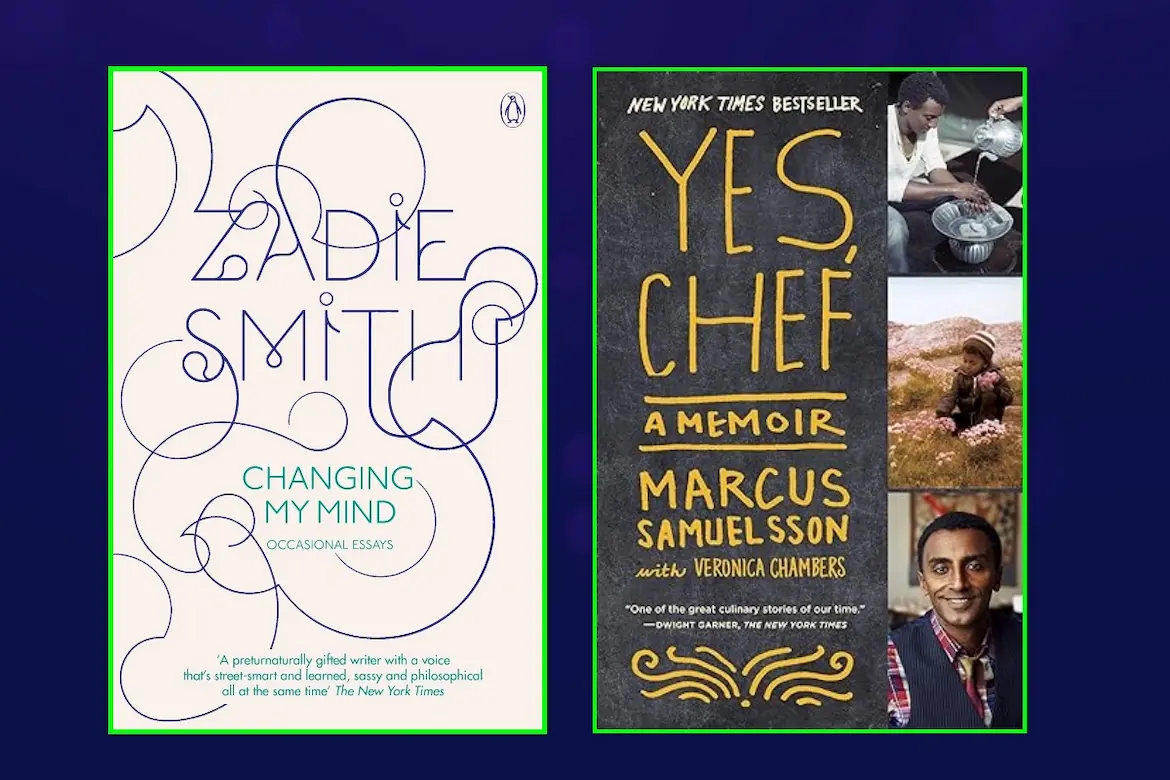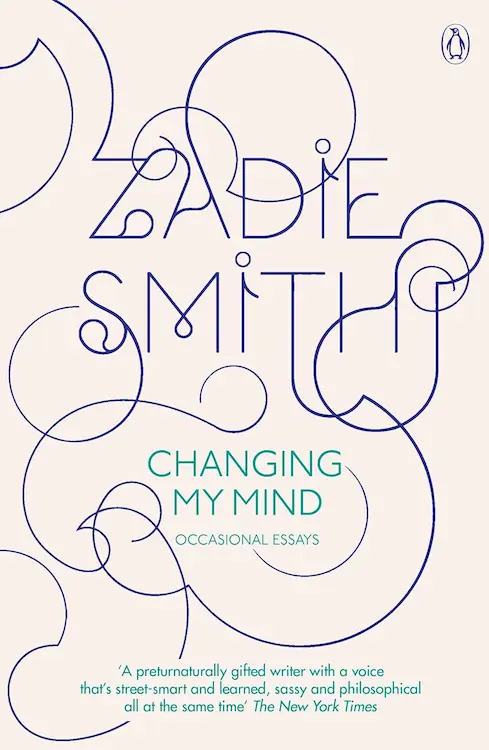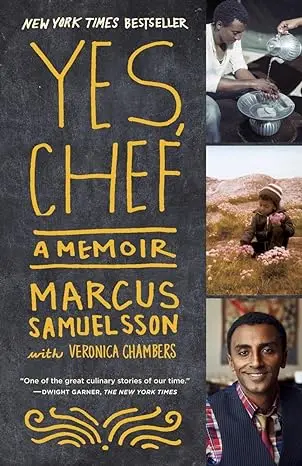In this LitStack Rec, we are looking at two past gems that you will want to read. First, a collection of essays by Zadie Smith that came about by accident in Changing My Mind, and second, the tasty memoir Yes, Chef for everyone and especially If you enjoy any aspect of cooking.
You can find and buy the books we recommend at the LitStack Bookshop on our list of LitStack Recs.

In This LitStack Rec of Changing My Mind and Yes, Chef:
Changing My Mind: Occasional Essays, by Zadie Smith
This collection Changing My Mind: Occasional Essays, came about by accident, Zadie Smith tells us in the foreword, but the voice and curiosity that drives it makes this a seamless and satisfying read. My hope, as a reader of essays, is to learn something, whether the topic is snow camping or religious fanatics or Monarch butterflies, but I also hope to learn something about the speaker who offers up these subjects. And with Smith, whether the subject is Nabokov or Forster, her personal investment is an intrinsic part of each brilliant interrogation.
Changing My Mind is divided into sections: Reading, Being, Seeing, Feeling, Remembering. Smith dips into culture and modernity, the writing life, personal history, and current and classic literature, including Kafka, Foster Wallace, and Zora Neale Hurston.
In “Middlemarch and Everybody,” Smith provides a thorough and elegant case for George Eliot’s empathic treatment of her characters by way of Henry James (who thought the novel “too copious a dose of pure fiction”), and Spinoza’s concept of conatus, or self-striving. That quality of doing good for society by doing good for the self, Smith shows us, can be found in the novel’s many characters, more than a few of which James deemed insufficiently complex. Eliot was nothing if not an empathic, an all-inclusive writer, and Smith shows us how radical a thing it was, in 1873, to take that approach, one that laid the groundwork for twenty-first-century novelists.
Smith excels at effortlessly unpacking complex subjects. From the foreword of Changing My Mind, we know many of the essays were commissioned: “I replied to the requests that came in now and then. Two thousand words about Christmas? About Katharine Hepburn? Kafka? Liberia? A hundred thousand words piled up that way.” There is the essay on Forster, of whom Smith has a strong and longstanding affinity; a moving personal history in “Smith Family Christmas”; and a trio of essays on film, including a great dispatch from the Academy Awards, “Ten Notes on Oscar Weekend.” It’s an essay so effacing yet razor sharp in its tone, I can’t imagine any other writer narrating the spectacle that is Academy Awards:
Hollywood has many tiers. Sitting by the pool are hot girls in bikinis and their jock guys, ordering twenty-dollar cocktails and lobster maki rolls, watching the dreamy water of the Hockney pool lap at the edges of the terra-cotta tile surround. Nobody swims. A young black couple, dressed in the Versace knockoffs they believe appropriate to this scene, pose in a lounger and get a waitress to photograph them, living the dream. This is repeated several times that afternoon, by Italians, English, Australians. Everybody speaks of the Oscars, loudly. It’s the only conversation in town.

Image credit: Britannica
Included in Changing My Mind is a version of a lecture given to the students of Columbia University’s writing program in 2010, now a staple of online creative writing links. “That Crafty Feeling” features Smith’s classic perceptive yet personal delivery in which she advises on a range of issues: starting, finishing, influences, routines, writerly devices. It’s all there in wonderfully digestible nuggets of common sense and humor. For example, the term for setting aside a draft for a spell before revision is called, “Step Away From the Vehicle.”
That interrogation of the world and the person yields a wonderful example in “That Crafty Feeling,” as Smith turns her attention to finishing a work of writing. These lines not only reveal the writer at her most incisive, she offers too a candid look at a starkly personal moment, showing us the elation and despair that come with completing a novel:
Who can find anything bad to say about the last day of a novel? It’s a feeling of happiness that knocks me clean out of adjectives. I think sometimes that the best reason for writing novels is to experience those four and a half hours after you write the final word. The last time it happened to me, I uncorked a good Sancerre I’d been keeping and drank it standing up with the bottle in my hand, and then I lay down in my backyard on the paving stones and stayed there for a long time, crying. It was sunny, late autumn, and there were apples everywhere, overripe and stinky.
It’s the kind of moment that deserves to be savored. The Sancerre straight from the bottle, the sun, the apples. You can almost see Smith’s tears of happiness graying the rock of the paving stones beneath her.
Watch Zadie Smith deliver the lecture, “That Crafty Feeling,” here.
—Lauren Alwan
Other Titles by Zadie Smith

Yes, Chef: A Memoir, by Marcus Samuelsson
The problem with many autobiographies of famous people who are still in their prime is that they tend to be highlight reels of obstacles overcome and accomplishments achieved to date. And master chef Marcus Samuelsson’s first few years were indeed tragic: born to a peasant family in Ethiopia, his father was believed to have been killed in tribal warfare that had been sweeping the country. He lost his mother to tuberculosis after she walked over 75 miles to the nearest hospital to get aid for her children, who were also sick. Orphaned at age 3, he and his older sister were adopted a year later by Lennart and Anne Marie Samuelsson, a middle-class white family in Göteborg, Sweden.
Yet even though Samuelsson opens his book with wistfulness for his lost heritage, he does not dwell on it; instead he concentrates on the wholesome and loving upbringing that molded the person he was to become. It was his grandmother Helga (or Mormor as he affectionately calls her) who fostered in him a love of food and its preparation, with her Swedish breads, her pickles and jams, the gooseberry preserves spooned over ice cream, the seared herring with lingonberries, and her signature roast chicken. But although he enjoyed helping his grandmother in the kitchen, Marcus’ life was also full of other typical “kid” activities: bike riding with friends, fishing with his father and working on a family boat with the other Samuelsson men, playing soccer (he even was on a youth league team that was like a farm club for professional and semi-professional organizations; he was devastated when cut from the roster for being “too small”).
While life was good for young Marcus, it did have its challenges. As a dark-skinned youngster in one of the most flaxen cultures in the world, a feeling of otherness was always present, even if overt racism was not. Still, Marcus had the advantage of a supportive family network, and a personality that was competitive but willing to watch and learn rather than needing to always be at the forefront. The work ethic evidenced by the entire Samuelsson clan was also passed on to the youngster, and although they were practical people, his parents encouraged their son to dream big and to believe in himself. Yes, it was a pretty good life in Göteborg.
But that world was too small for someone whose aspirations grew along with his expanding knowledge, and it’s Samuelsson’s journey from small Swedish town to the top of the culinary universe that is truly captivating. Yes, Chef is definitely not a “tell all” book, nor one that dwells on drama or plays to unbridled ambition, but neither does it shy away from the less than shiny aspects of working behind the scenes in a fine dining establishment. Perhaps most challenging for Samuelsson was the openly prejudiced attitudes evident in the kitchens themselves.

The truth was I chatted with no one, but it particularly sticks with me that I didn’t chat with him [the other black man in the kitchen, a dishwasher]. We were, after all, part of an underclass, objects of a prejudice that showed up in the common vernacular of the kitchen. Just as in Switzerland, the French term for low-level kitchen assistant is negre, which directly translates to “black”. I’d heard people use it countless times, people whose politics are straight up, people who consider themselves worldly and unprejudiced. But there it was, and every time I heard it the word was more than a word, it was another wall I had to climb.
Samuelsson doesn’t spare himself in laying bare some of the less than stellar decisions made and paths followed. He admits that he wasn’t a saint during the years that he was establishing his reputation, and some of his shortcomings deeply affected others in very personal and even negative ways. His candor is necessary but I’m sure it didn’t make his story easy to write, and those parts were not easy to read.
However, the best and most gripping parts Yes, Chef occur when Samuelsson takes us into the mindset of a master chef; all the factors and criteria that flow so easily, and the others that must be carefully uncovered and meticulously mastered. The patience, dedication and focus that goes with being at the top of the culinary field, the toll of the journey, the unexpected challenges that have little to do with putting food on the plate, and the ultimate joy of discovery and triumph is altogether epic in its own realm.
How can I describe the result of this [spice] blend? It was both masculine and feminine, shouting for attention and whispering at me to come closer. In one sniff it was bright and crisp; in the next, earthy and slow. I couldn’t wait to take it back to Aquavit’s kitchen and start experimenting.
If you enjoy any aspect of cooking – whether it be producing scrumptious meals or succulent dishes, or if you simply like watching others do so – then Yes, Chef will prove to be a delicious offering, easily devoured and sure to leave you full and satisfied at the end.
—Sharon Browning
Other Titles By And About Marcus Samuelsson

Other LitStack Resources
Be sure and look t our other LitStack Recs for our recommendations on books you should read, as well as these reviews by Lauren Alwan, and these reviews by Sharon Browning.
As a Bookshop, BAM, Barnes & Noble, Audiobooks.com, Amazon, and Envato affiliate, LitStack may earn a commission at no cost to you when you purchase products through our affiliate links.
You can find and buy the books we recommend at the LitStack Bookshop on our list of LitStack Recs.






